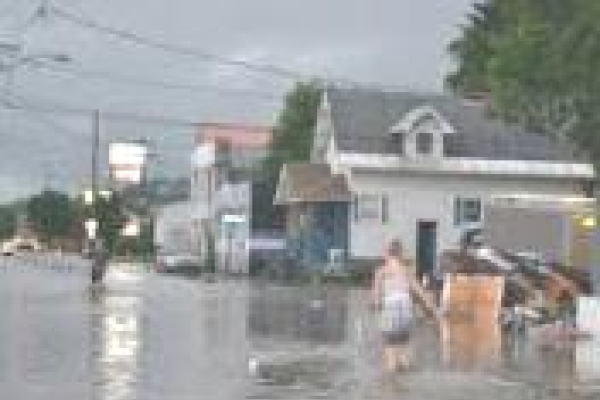July 2, 2013
Health Department Urges Precautions In Aftermath of Flooding

The Oneida County Health Department is urging residents impacted by recent flooding conditions to take precautions when dealing with flood waters resulting from the heavy rains and overflow conditions.
County Executive Picente said "In our ongoing effort to assist and inform those impacted by the flooding we ask that everyone take the proper precautions at this time. The Oneida County Health Department has released safety measures residents should take to keep them and their families out of harm's way. This is the beginning of a long recovery and keeping everyone safe and minimizing health risks is our top priority.”
“Flood waters can pose many health risks whether its running across a roadway or standing in your basement,” Dr. Daniel W. Gilmore, Director of Environmental Health said. Gilmore continued, “For some residents contact with the flood waters are unavoidable, but precautions should be taken to avoid possible injury or illness that could result.”
According to Gilmore, during flooding the greatest risk comes from moving water. The deeper the water, the greater the threat. As little as a foot of moving water could wash a vehicle off the road so people should avoid driving in moving water regardless of the size of the vehicle.
Waters that pool on streets and properties carry their own risks. Road surfaces become obscured causing drivers to unknowingly steer into deeper water such as canal or pond. Electricity from streetlights and power poles may be active through standing water causing a deadly electric shock to anyone in contact with it. Children playing in contaminated standing water may become sick or bitten by floating insects. Anyone who comes into contact with floodwaters should wash any exposed body parts with soap and disinfected or sanitized water.
Drinking contaminated water could cause serious illness. You cannot assume that the drinking water supply in an area affected by flooding is safe to drink. Listen to local announcements regarding possible boil water notices in your area. Persons with private wells in flooded areas need to be aware of possible contamination by disease-causing organisms making the water unsafe to drink. If you think your drinking water may have been contaminated you should have it tested by a certified lab before consuming it. The Mohawk Valley Water Authority in Utica, (792-0301) and Verona Labs (363-5841) can perform this service. Meanwhile, health officials recommend boiling water for three minutes before using it for drinking, washing or cooking. Disinfect water by adding 8 drops (about 1/8 of a tsp.) of unscented household bleach per gallon of water and let stand for 30-minutes. If the water is still cloudy after 30-minutes repeat the process or use only bottled water, especially for mixing baby formula.
Do not eat any food that may have come into contact with floodwaters. Discard any foods without a waterproof container if there’s a chance it has come into contact with floodwaters. Undamaged commercially canned foods can be saved if your remove the labels, wash the cans, and then disinfect them with a solution consisting of ¼ cup of unscented household bleach per gallon of water. Re-label the cans including the expiration date using a marker. Food containers with screw caps, snap lids and home canned foods should be discarded after coming into contact with flood waters, since they cannot be properly disinfected.
Discard wooden cutting boards, plastic utensils, baby bottle nipples and pacifiers since there is no way to disinfect them once they have come into contact with flood waters. Thoroughly wash all metal pans, ceramic dishes and utensils with soap and hot water or by immersing them for 15 minutes in a bleach/water solution.
Basic hygiene is of particular concern after a flood. Always wash your hands with soap and water that has been boiled and cooled. Hands should be washed before preparing or consuming food, after using the bathroom or changing a diaper, playing with a pet, after handling uncooked food, handling garbage, after tending to someone who in sick or injured, after coughing or sneezing and after handling articles that may have been contaminated by flood waters.
For more information on dealing with flood conditions and their aftermath, log onto to the Oneida County Health Department web site at www.ocgov.net/oneida/health.









